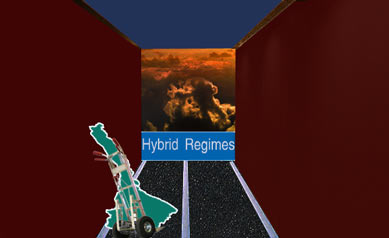Don’t Challenge Me: Lessons From The Virtual World

Teaching is one of the hardest jobs out there. Certainly, it is a real challenge to pass on knowledge. You not only ought to know the subject, but must also have the special talent to transfer the knowledge. When I am talking about “knowledge” it is not the knowledge that is measured by the formal standardized “praxis test.” I am talking about the “informal knowledge” we get from informal exchange. If you may, call it knowledge gained from mutual learning in a format of discussion.
Surprise! Surprise! It could be daintily odd, but there are some of our citizen, by virtue of their formal academic achievement, believe that they are the only knowledge carriers, and by extension also are the only teachers in their mind. I am sure many of us have encountered these naked foolish emperors revealed in all their foolish glory. Notwithstanding, their attitudes could be summed up as: “if I am a teacher you can’t challenge me.” They will never stop from bragging of their achievement and making ostentatious arguments. This small-outfit group, in their arrogant chauvinistic behavior, indirectly claim that they are the oracle of nature and truth. No affinity of peripatetic allegiance to diverse knowledge that comes from others. Not at all! For them, it is usually easy to appreciate their own traits but hard to appreciate those of others. In fact they are stubborn and even downright pigheaded. We know them very well; their success didn’t contribute to the wellbeing of the Eritrean people except to themselves. In a nutshell, they don’t own the common touch of our people.
In the physics of politics, actions generate reactions. Ah… this is a real encounter that rigged you to explode and feel like the skin is rotting off your foot. Too often we allow ourselves to be tyrannized by our elites in a manner that Fraud called “the narcissism of small differences.” They are transplanted within us like a circular firing squad. You will occasionally see them in full swing and floating with casual innuendo – and of course they are a whack-mole quality. In such circumstances, therefore, the first instinct is, to shot them with knowledge alien to them, a bold stroke, when they come running up to you with that attitude. This is not a “recency bias” or subconscious bias as psychologists call it. Here we challenge them with bromide worthy – “face the multiplicity of knowledge.”
Apparently, it is not a sarcastic humor for consumption, nor is it a drama for entertainment. It is a true encounter thrown out to discussion to challenge them to find their strengths in our diversity of knowledge. I want them to struggle and improve the downside of their strength similar to the rest of us. I want to remind them that we vary in the traits—we all posses the strength we exhibit. I want them to learn how to flex, how to be the best of themselves, but still work around their weak side, and sometimes borrowing insight from those who are not like them. At least my encounters know whom I am referring to.
Really, for them, it is a tempting, almost irresistible, to gravitate to the nearest example at hand to calculate their achievement. But for sure, they do not embody the most meaningful representation of our abilities. Not at all! They are involved in magnifying an accomplishment, out of proportion to its importance, as the evolutionary psychologist Robert Wright characterized such self-aggrandizement behavior.
In the knowledge of give and take, the recourse is a two way street. Hence at any moment the mind must be open on both sides. John Cotton Dana once said, “One who dares to teach must never cease to learn.”. Dana was referring to the “reciprocal implicit nature” of knowledge. Invariably knowledge is infinitive and addictive, and lives in every one of us at a varying degree depending on the areas of influence. Knowledge is not acquired by regular schooling only. It is also acquired by avid reading, cultivating and nurturing your talent. I for one want this message to fly right to the faces of those in the fringes who dare to say “we know all for you.”
For a moment, let us observe the insight of a simple isomorphic experiment, something done by some experts. I will not give you the entire experimental procedure of the case study; instead I will use the result of the study for my argument. In a “blind tasting”, experts and consumers alike are, for the most part, unable to distinguish expensive wines from the cheap ones. I love this study, don’t you? I love it, because it elucidates or throws light on something, especially if we use it as metaphor in our politics. In real politics the public sometimes faces difficulty in differentiating between elites with moral ambiguity and elites with moral clarity. The former subscribe to the British conservative statesman Stanley Baldwin. Baldwin is assumed to have quipped, “I would rather be an opportunist and float than go to the bottom with my principles around my neck.” Yes, indeed we have elites with opportunist stances as legitimate choice. With their corrosive political irresponsibility, they never stop from trying to wax indignantly on the middle-road, keeping an eye on the direction of the momentum. Nevertheless, when it is said and done, they will not shy away from telling us, that they were part of the democratic change. The later however, are viewed as verdant Utopia by their adversaries. But in reality they are intellectual beavers with big ideas and who understand the nature of our social contradictions and try to look for a practical solution.
Rollo May defined evil in a system of ethics as something, “which tears you apart, shuts out the other person, raises barriers, and sets people against each other.” It is not surprising that our elite, in a virtual world of pen names, are playing the same game, to set our diversity against each other, to build barriers between cultures, and tear apart all the web of our social fabric. We know communities breed character. Eritrea is a fabric of social relationships. It is not an agglomeration of individuals. Don’t listen to some of the elite who use individual right against group rights. Individual and group rights are two inseparable human values. Those who oppose group rights are those who oppose the right of diverse groups as a strategy that would pave the way for the tyranny of the majority. Watch them carefully.
In conclusion: Cutting is not enough to build a harmonious society. To avert societal breakdown, we have to restore our values… the values of respecting the rights of our social diversities. It is a social and political agenda to foster equilibrium between the stakeholders. If we believe in social trust as a precondition for a healthy society, we have to recognize the grievances to inspire trust and avoid degradation. I believe that firm attachment and stable relationships build “human capital.” Let us strive to achieve it.



Awate Forum